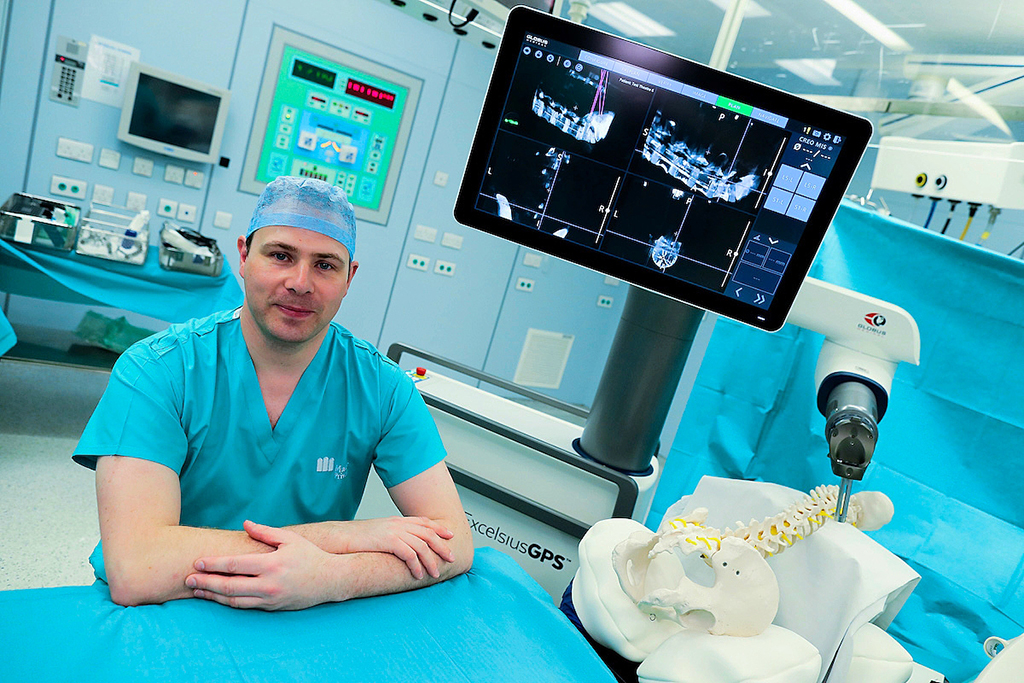THE Mater Private Hospital has become the first facility in Ireland and the UK to introduce cutting-edge robot-assisted spine surgery.
Patients undergoing spinal fusion surgery could now experience significantly less post-operative pain and much quicker recovery times, thanks to the addition of the surgical guidance robot at the Northside hospital’s orthopaedic and spine centre.
The new robotic guidance technology assists surgeons with the precise and accurate placement of spinal screws during spinal fusion surgery – reducing the potential for complications.
Its 3D visualisation and navigation features will allow surgeons at the Mater Private to complete more complex and delicate spinal procedures with improved patient outcomes, reduced blood loss and muscle damage during surgery.
The Mater Private is one of just four centres in Europe using the highly advanced ExcelsiusGPSTM robot.
Consultant Spine Surgeon at the Mater Private, Joseph Butler, was the first surgeon in Ireland to use the new technology as part of a spinal procedure carried out recently at the hospital.
Mr Butler and the wider spinal team at the hospital have observed the deployment of this technology in spine surgery and its positive impact across comparable healthcare settings in the US.
“The introduction of the robot is a fantastic addition to our spine surgery capabilities at the Mater Private Hospital,” he said.
“Robot-assisted surgery is a new, emerging area that will become the standard of care in the years ahead.
“As an early adopter of such technology, the Mater Private is ensuring that our patients are receiving the highest quality care using the most advanced methods and practices available.
“The technology, much like the GPS devices we use every day, supports surgeons in their work by ensuring greater surgical precision and bringing even greater accuracy to procedures such as spinal surgery.
“Most patients contemplating surgery, naturally, want to know when they will be able to resume their usual daily activities. With this robot we can offer patients requiring both routine and complex spinal fusion surgeries a solution that allows them to recover and get back to their daily life much quicker, with less post-operative pain.”
The potential for robotic spine surgery to enhance the lives of patients by delivering more accurate surgery and faster rehabilitation was a key consideration in bringing the technology to the hospital.
The team has been undergoing extensive training in the United States over recent months to prepare for the robot’s introduction to the hospital.
It is anticipated that the ExcelsiusGPSTM robot will be used to assist surgery in one third of the total spinal procedures at the hospital this year.
Mater Private Hospital Chief Operating Officer, Dr Caroline Whelan, welcomed the new technology.
“At the Mater Private Hospital, we are committed to providing the highest quality of care for our patients,” she said.
“We place a strong emphasis on introducing new technologies which support our healthcare professionals to deliver better care and our patients to achieve faster recovery.
“We are pleased to offer some of the most technologically advanced treatment options in the country. We have performed over 2,200 robotic-assisted surgeries since 2011, when we first introduced the Da Vinci surgical robot to Ireland.
“The introduction of the ExcelsiusGPSTM robot to the Mater Private Hospital for spinal surgery is another first.
“If a patient requires spinal fusion surgery, the ExcelsiusGPSTM is the safest and most effective way to complete the procedure, resulting in smaller incisions and shorter patient recovery times. We are proud to be one of just four centres in Europe to offer this technology to patients.
“We look forward to the exciting opportunities that the introduction of the ExcelsiusGPSTM robot brings to the field of minimally invasive spine surgery and robotics in Ireland.”
